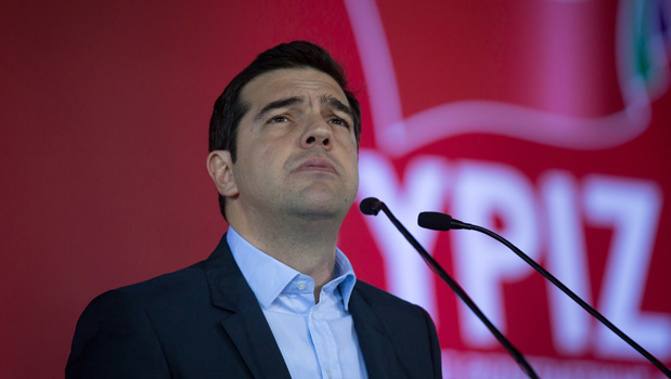
Greek Prime Minister Alexis Tsipras has vowed to push ahead with a controversial bailout referendum despite pressure from European leaders, and urged creditors to accept a fresh reform offer by Athens.
Hours after Greece became the first advanced economy to default on the IMF, the leftist leader used a televised address on Wednesday to tell Greeks to vote 'No' on Sunday to creditor austerity demands.
Eurozone finance ministers agreed on Wednesday to wait for the result of the referendum before holding any more discussions on Athens's debt crisis, Slovakia said.
German Chancellor Angela Merkel had already insisted there could be no new deal before the plebiscite.
"A 'No' vote does not signify a rupture with Europe, but a return to the Europe of values," Tsipras told the nation, rebutting accusations from EU leaders that the plebiscite was essentially a vote on whether to stay in the union.
"Come Monday, the Greek government will be at the negotiating table after the referendum, with better terms for the Greek people," he added, standing between Greek and EU flags.
The radical Greek leader spoke hours after Merkel effectively ruled out all negotiations until after Sunday, saying that Europe could "calmly" await the outcome of the referendum.
"The world is watching us. But the future of Europe is not at stake," Merkel told Germany's Bundestag lower house of parliament.
But there were signs the crisis was opening rifts in Europe's united front, with France's leader Francois Hollande urging an "immediate agreement" after six months of stalemate with the radical-leftists in Athens.
A poll on Wednesday showed the 'No' camp in the lead with 46 per cent, against 37 per cent for 'Yes' and 17 per cent undecided. However the 'No' vote share was down compared to before capital controls were introduced on Sunday.
The Council of Europe rights group meanwhile said the vote fell short of European standards.
Greece entered uncharted waters with its default on a 1.5 billion euros ($A2.17 billion) International Monetary Fund loan, the first by an advanced economy, and expiry of its current European bailout on Tuesday.
It is now without external financial assistance for the first time in five years, while at home the banks will be closed all week, although around a thousand branches opened on Wednesday to allow the elderly to receive pension payments.
Greece on Tuesday made a last-minute proposal for a third bailout worth nearly 30 billion euros to follow the two rescue programs worth 240 billion euros that cash-strapped Athens has received since 2010.
On Wednesday Tsipras said he was ready to accept terms offered by the creditors on Sunday, despite the fact that German Finance Minister Wolfgang Schaeuble said that proposal was no longer on the table.
"The Hellenic Republic is prepared to accept this ... agreement subject to the following amendments, additions or clarifications," the letter said, referring to the reforms-for-cash contract binding Greece with its creditors.
The government said any deal would have to allow Greece to maintain a 30 per cent VAT discount on islands and postpone a 2012 pension reform until October 2015.
Missing the IMF payment means that Athens "can only receive IMF financing once the arrears are cleared", IMF spokesman Gerry Rice said in a statement.
The IMF will rule "in the coming weeks" on Greece's request for a rare extension, a source close to the matter told AFP Wednesday - something it has only done twice before in 1982 for Nicaragua and Guyana.
Greece faces further big repayments to the ECB on July 20.
The International Monetary Fund says that allowing a borrower to delay repayment, as Greece has requested, is generally ineffective in helping a country overcome crisis.
"The IMF does not extend payment terms as a matter of longstanding policy," the global crisis lender said in a statement on Wednesday.
"More than 30 years ago, the IMF granted a few low-income countries delays at their request, but in each case the delay proved not to help with immediate financing needs or fundamental economic problems."
Greece asked for an extension on its 1.5 billion euros ($A2.17 billion) IMF debt payment on Tuesday just hours before it was due. Greece failed to make the payment, becoming the first advanced economy to default on a loan to the 188-nation institution.
The IMF executive board, which did not rule on the Greek government's request, will review it "in the coming weeks," a person close to the matter told AFP on Wednesday.
A ruling in favour of the request would mean the country would not be officially judged "in arrears" on its loan, the IMF's terminology for default. Being in arrears makes a country ineligible to draw on IMF financing.
Meanwhile, Greece faces a payment of 455 million euros due to the institution on July 13, and another 284 million euros on August 1.
In its statement Wednesday, the IMF emphasised that Greece's problems would be best addressed through a "balanced approach" combining Greece's steps to reform its economy and the country's European partners providing additional financing and debt relief.
"The IMF's priority remains helping the Greek people through this difficult period of economic turmoil," it said.
Take your Radio, Podcasts and Music with you









